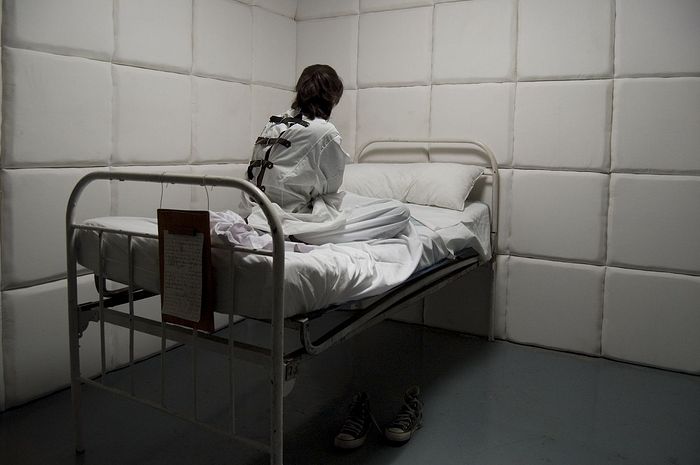Occultism and Mental Health
Even as late as twenty years ago, many religious circles were sceptical of psychiatry and considered any case of schizophrenia to be possession by an evil spirit. “No medication is needed! Exorcism is the only solution!” was the slogan of the day. Nowadays psychological assessment is in vogue, and the situation is reversed. Some church people, including high-ranking church officials, believe that in most cases the causes of mental illnesses are physiological in nature. “No confession is needed. Medication is the only solution!”
Correct identification of the cause of illness is obviously conducive to its successful treatment. Naturally, if the illness is brought about by sin, it cannot be cured by medication alone. There is no medication that can cure sin. However, many people, including those involved in the Church, deny that sinning has anything to do with mental illness.
I tried to clarify this issue by talking to our renowned Orthodox psychiatrists, but their responses were elusive. Maybe there are Orthodox scientists who have reached decisive conclusions, but I found no information on this matter in open sources.
That is why I would like to share my observations on the subject. They may shed light on at least some of the circumstances. As a psychologist, I come across many people with mental health issues. I mostly meet them through www.zagovor.ru, my anti-occultism website, and www.pobedish.ru, my suicide prevention project. Both projects are the largest in their respective fields. At the peak of its popularity, the former was visited by 5,000 people a day, while the latter still gets 15,000 visits daily. The information I receive through the sites allows me to see patterns behind the individual cases. I don’t profess that my observations are scientifically sound or insightful, but logically I can draw simple conclusions or at least make hypotheses.
Consequences of Occultism
I had to pay for my “supernatural powers” with a ruined love life, health problems and severe depression.
Story No. 1. “When I turned 14, I unexpectedly developed psychic abilities. With foolish teenage maximalism, I started telling the “truth” to my parents’ friends. Once there was even a frying pan fight, when an angry couple decided to have it out right in our apartment after I told the woman that her husband was unfaithful to her. Unfortunately, my prediction was correct, and the woman found the evidence of her husband’s cheating. I was bursting with pride and vanity, feeling powerful and superior to others. Besides, in addition to my clairvoyant talents, I could make something bad happen to my enemies or those who said something that I didn’t like. Even a friend would suddenly spill hot water over himself after criticizing me, and people I disliked would stumble and fall for no reason when they walked. I was so proud of my abilities. Psychics accepted me as one of their own. But I had to pay for all that with a ruined love life, serious health problems (huge pimples on my face, digestive disorders, and, finally, a breast tumor that had to be surgically removed), and severe depression. In the end, I had to be treated with tranquilizers…” —Alyona, 30.
Story No. 2. “I am a physician. My mother, 68, developed a mental illness after communicating with her friend and using pendulum dowsing and practicing magic with her. Now she is receiving a treatment course in a mental hospital for the second time as she is mentally and physically devastated. People used to think that she was younger than 55, now she looks like she is 80.” —Kseniya Anatolyevna
Story No. 3. “When I was 18, I started dating a girl and fell in love. We quarrelled, broke up then started dating again; in other words, we’ve been through a lot. When I started feeling unwell, people suggested that I should see a healer, so I did, and she told me that I was jinxed and that my girlfriend was an energy vampire. I didn’t believe her. I took my girlfriend, her mother and my mother to another healer, and she openly accused my girlfriend of casting a love spell on me. There was a scandal. I started going to various healers and got myself totally confused. I was drawn to my girlfriend even though she was ugly as sin. I quit my job and studies and went to Moscow for a year and a half. When I arrived there, I found some books and tried casting love spells on her, summoning evil sprits, demons and so on… It got so intense, that I decided to go to a monastery for treatment, but two or three days later I started seeing hallucinations and hearing demonic voices. I couldn’t even go to the spring where people swam. The water in the spring seemed like molten metal to me and I roared like a beast when I tried to go in, so the priest couldn’t immerse me. They brought me back home, and next morning the hallucinations started again. I saw demons, heard voices, etc. My mother called an ambulance and they took me to a mental hospital where I spent forty days. I don’t know how I survived it. I spent two weeks in the intensive care unit. After that, I was so weak that they had to walk me out of it. I spent a year at home, sleeping, eating and barely talking to anybody. It took me another year to relearn how to walk and talk again and how to not be afraid of people. I spent the third year learning how to work on the computer. In the end, I was diagnosed with paranoid schizophrenia. Now I’m unemployed and have no luck with girls…” —Anonymous
These are just three out of many stories that were submitted to www.zagovor.ru. All the stories submitted to the site have a typical plot describing how regular occult practices (varying from fortune telling to casting love spells) led to being diagnosed with a mental illness or exhibiting symptoms of mental illness. After studying all these stories, a conclusion can be made: In a majority of cases, prolonged occult practices lead not only to physical or personal problems, but to development of mental health issues.
It can be deduced that God often punishes those committing the sin of occultism with mental health problems. It does not always result in psychosis, but occultists are practically guaranteed to develop depression.
What do suicides have to do with this?
Real mental health issues develop after the suicide attempt rather than before.
These two seemingly different grievous sins, occultism and suicide, share a similarity. Both are theomachist in nature, so they are punished in a similar way. Suicide attempts are quite often followed by the development of mental health issues. Based on a great number of suicide stories submitted to www.pobedish.ru, a conclusion can be made that real mental health issues develop after the suicide attempt rather than before. What happens before the attempt is only the beginning; the worst comes after. Psychiatry deals with the patients progressing “from mental health issues to suicide attempt”, but there is no research on the progression “from “suicide attempt to mental health issues”.
Of course, suicides are often attempted by people who have already been diagnosed by a psychiatrist. But if they haven’t and there were no symptoms, the symptoms might develop after the attempted suicide. If the symptoms were already present, they are most likely to get worse.
When I noticed that this pattern was so widespread, I started asking all my clients who had either mental health symptoms or diagnosis to answer two questions. First question: Have you ever practiced occultism (fortune telling, incantations, casting love spells, magic)? Second question: Have you ever attempted suicide?
It wasn’t a formal research, so I didn’t keep the exact statistics. However, I estimate that approximately every third client with mental health issues dabbled in occultism or had suicidal tendencies. Despite the popularity of occultism in our country, these numbers seem to be higher than average. Again, I don’t have the exact numbers, but judging by the people around you, you can clearly see that not every third person you know dabbled in magic. Based on my work on www.zagovor.ru website, I estimate that no more than 10% of adults had practiced occultism repeatedly.
So, what does it mean? It is quite likely that often (admittedly in up to one-third of all cases) mental illnesses are caused by occultism and suicide (with occultism-related illnesses being observed more often than those caused by suicide attempts). People with such issues seek psychiatric help, but as the vast majority of psychiatrists are atheists, they don’t even attempt to identify the true cause of the illness.
Exorcism, or medication?
“Like cures like,” they say. Does it mean that the illness caused by actions of spiritual nature must be cured by the same kind of actions? It is known that sin is cured by confession, Communion and overcoming the habit to sin, which eventually even leads to developing hatred of sin.
Medication is necessary, as medical therapy will help initiate spiritual self-improvement.
Of course, medication is necessary even if the illness is of a spiritual origin! The state of mind of people with mental health issues often precludes them from leading a normal church life. Self-improvement requires being aware of yourself and your surroundings, but that is what is often obscured by the illness. After receiving medical therapy prescribed by the psychiatrist, people can proceed with spiritual self-improvement. I know many people who receive both medical and spiritual treatment, and their health is improving.
Unfortunately, mental illnesses are generally hard to treat. For some reason, that’s the way God set it up. Even spiritual treatments do not yield instant and sure-fire results. I have never heard of people being cured of a serious occultism-related mental illness after going to confession and repenting their sins.
Does this mean that mental illnesses caused by occult practices or suicide attempts must be treated only by medication and psychotherapy, and that we must totally disregard what might have been the root cause of the illness?
I am sure that there is no harm in identifying the possible cause of illness, repentance and self-improvement, and that they often lead to improving the patient’s health.
Confessing a grievous sin is not enough. You must “suffer it through”, realizing what you’re suffering for.
Many former occultists believe that all it takes is to repent of their transgressions once during confession and they will be innocent before God. However, venerable Ambrose of Optina used to say that confessing a grievous sin is not enough. He believed that people must “suffer it through”. Suffering it through doesn’t mean simply suffering. It means suffering while realizing what you’re suffering for and accepting such suffering as a cure. Improvement is more likely to occur when the patient treats the disease this way.
As an example, I’ll tell you three stories about people who became practicing Christians after renouncing the occult practices.
Story No. 1. “I started drinking, smoking and having affairs with guys and girls. I was out of control. Half a year later, the panic attacks started, I was having nightmares all the time. I’ve never felt so bad before. This turned me into a drama queen, I wept all the time and could wander the city for hours simply because I didn’t want to come home. Thank God, at some point I realized that I couldn’t go on like that… I realized that only God could help me. It took me a lot of time to muster my courage to go to church, and I started attending services and praying at home as best as I could. It took me even longer, almost a year, to work up the nerve to go to confession. I was so ashamed and afraid! But I brought myself to do it, and gradually I started feeling better. I never felt so free and happy in my entire life. After my first confession and Communion, I felt like a huge weight had been lifted off my shoulders! Although I occasionally still have a heavy heart, now with God’s help I can overcome the blues!”—Irina, 25.
Story No. 2. “Most importantly, I couldn’t think straight. Despite graduating from college with the highest distinction, I couldn’t add 2 and 2… I felt so bad!!! Once I chanced upon an Orthodox bookstall at a railway station and they gave me a free issue of Foma magazine. I read an article about St. Nicholas the Wonderworker. My first reaction was that it was all made up. When I came home, I felt miserable. I experienced such spiritual torments that I thought I would die. I knelt down and addressed the image on the magazine cover, “Help me! I’m so depressed!” Suddenly I felt that I had to go somewhere. I walked though the entire city, not knowing where I was going. When I snapped back, I saw the Church of the Protecting Veil of the Mother of God. I had never honored Her and never thought about asking the Queen of Heaven for help. I stood in front of the church for a while and then headed home. It was August 29 [The afterfeast of the Dormition of the Theotokos.—Trans.]. The church bells were ringing so loudly that they could be heard throughout the city, and I felt that with every strike, whatever bad that was in me was disappearing. I repented and partook of Communion. I no longer wanted to steal, didn’t want to talk to myself and felt no anxiety. On that day, I burned my all books by Stepanova [A possibly fictitious healer, author of a series of books on casting spells.—Trans.]. For the first time in my life, I saw how the paper smoldered, as if refusing to burn. But I finally burned every page of that nasty stuff!”—Olga, 24.
Story No. 3 “I was reading everything that I could find, including the books by Norbekov, Sviyash, Zeland, Luule Viilma, Osho and others. In the spring of 2000, I suddenly experienced an incredible surge of energy that made me feel like I was the chosen one. My mind was altered, and my head was buzzing with information. After a few sleepless nights, I came to work and told my boss, “I saved Russia, now you have to save the world.” My coworkers called my relatives, and I ended up in a psychiatric clinic. I was horrified. I should have stopped and thought about what was happening to me, but I kept searching for those strokes of insight and trying to achieve an altered state of mind. I was looking for an enlightened master, trying to enter into the Absolute, and going to psychics. As a result, I was diagnosed with Category III psychiatric disability. Now I’m on medication. God sent me a husband who introduced me to Orthodoxy. Even though my mind was poisoned with esoteric teachings, I understood how far I was from God and the Truth. I’m gradually becoming a more religious person. I’m 40 now, and I’m expecting a baby. I’m planning to ask the priest to perform the rite against occultism and I pray to God to protect my child, so that my baby won’t be harmed by my sinful practices. I can’t say that everything is easy now, I still have problems. But now I see the way out. When I fall, I get up and move on, praying to God. Thank God for everything! I thank God that I’m alive and that I didn’t lose my mind. I can still pray, think about what I did and repent!” —Elena, 40.





